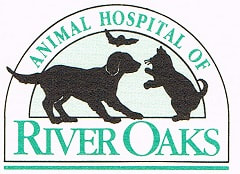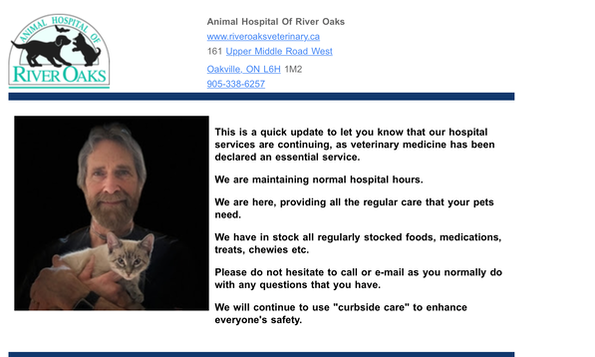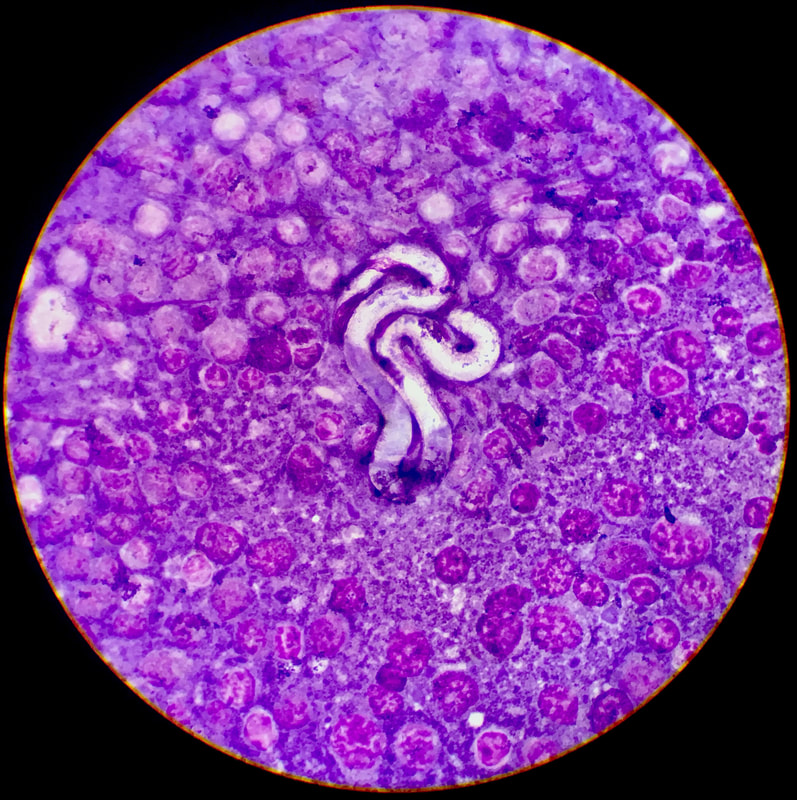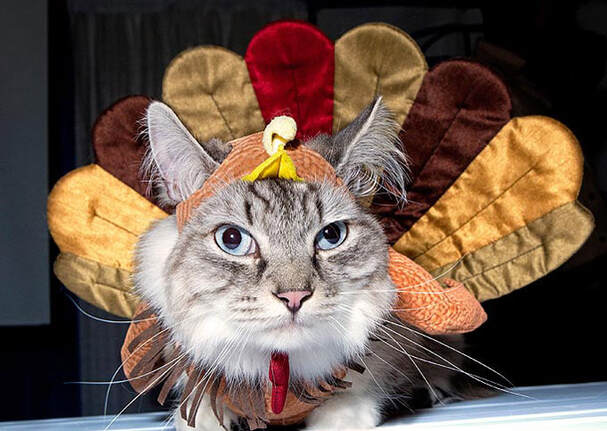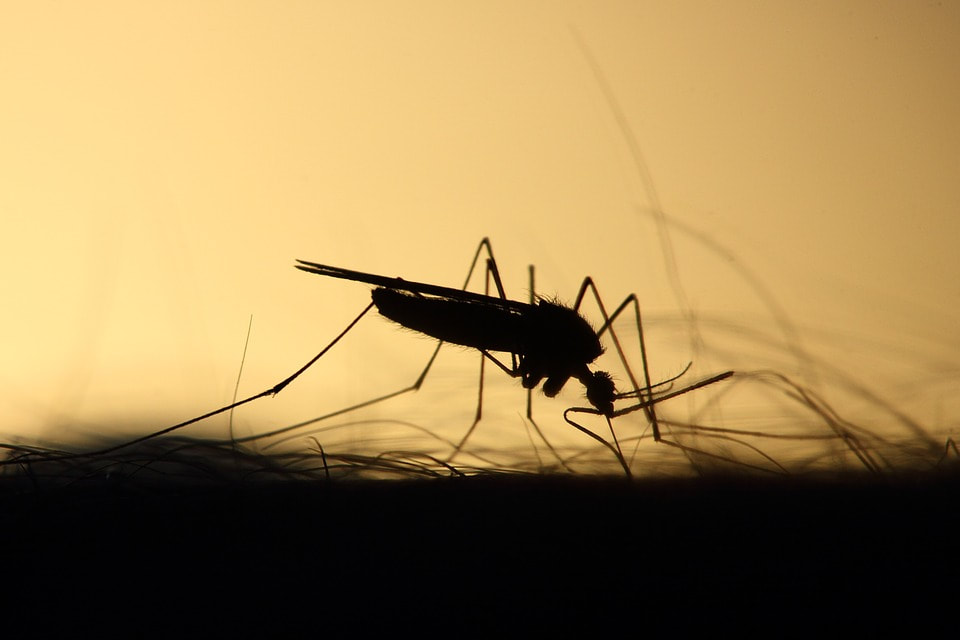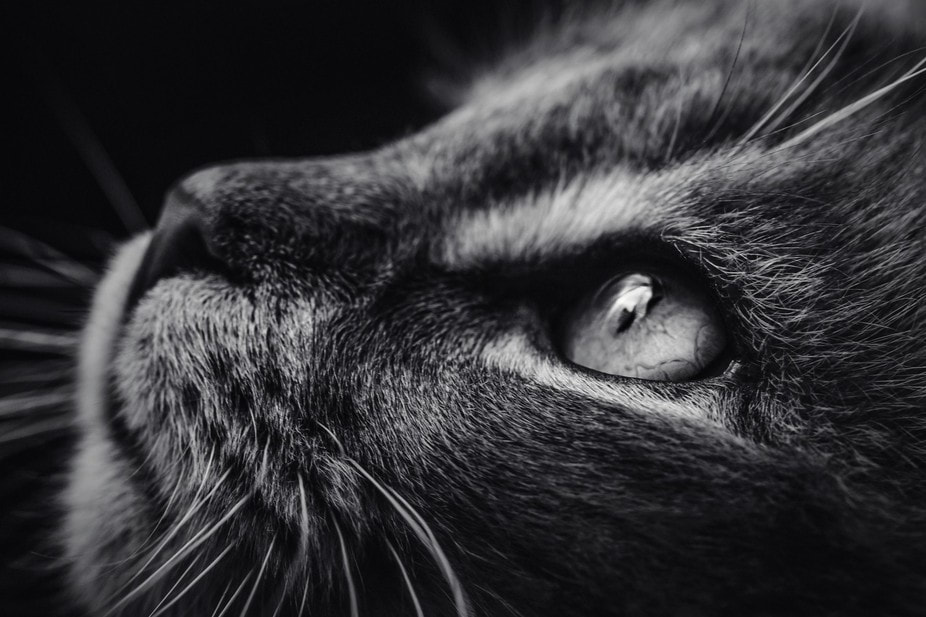|
Here is an article written by Dr. Gold, published June 2020 by the College of Veterinarians of Ontario in their public Newsletter: (Click on the link to see the full newsletter) http://cvo.informz.ca/z/cjUucD9taT0xMjAzMzg4JnA9MSZ1PTkwNjQ3NzczNCZsaT0xOTI5MjQ0Mg/index.html Practising companion animal veterinary medicine during a world health crisis By: Dr. Lorie Gold For the past 40 years veterinarians have been working hard to teach animal owners that the best care is preventative care. Years ago veterinarians used to practice medicine like firefighters did their work...putting out fires when they happened. In other words, when an animal got sick or injured, veterinarians would be called to diagnose and treat the illness or injury. Preventative medicine is a different approach. With regular checkups and a program of care for each patient, veterinarians in recent decades could help to maintain the health of our patients in a more proactive manner. By conducting examinations on a regular basis we find out about problems while they are still minor and treatment planning prevents them from becoming major health issues. Wellness examinations and routine blood work detect diseases not yet showing any symptoms to their families. Vaccinating against common contagious, infectious diseases allows us to make these conditions rare. Dental care helps to maintain patient health. By prescribing anti-parasitic medications along with appropriate blood and fecal testing we prevent diseases caused by or passed on by parasites. COVID-19 changed all of this. From a veterinary team’s perspective it has been like a step backwards in time. While veterinary care was deemed an “essential service” for the first week of the shut down associated with the pandemic (in Ontario), within a week we were restricted to “urgent care” only. This meant back to “putting out fires”; treating animals only as needed when families noted problems themselves. The first changes we had to put into place were changes in support of social distancing. Veterinary teams always work hard to ensure that our reception areas are welcoming to clients, families and our patients. With the need to maintain social distancing, we suddenly had to introduce a whole new style of practice, called “curbside care”. This means that veterinary hospitals are keeping their front door locked, with clients no longer coming inside our hospitals. Instead, clients call from their cars when they arrive, a staff member wearing personal protective equipment goes out to the car, brings the pet into the hospital and the veterinarian conducts the examination while using the telephone to communicate with the client in the car. The second major change that many practices put into place is a more regular use of telemedicine. In support of social distancing the College of Veterinarians of Ontario temporarily enhanced (during the pandemic) the ability of veterinarians to use telemedicine to help families and their pets. Telemedicine procedures give us the opportunity to diagnose and prescribe for patients without a physical examination, utilizing client’s observations, e-mailing of photos, videos and video-conferencing. Veterinarians are used to touching our patients. We look, palpate and even smell our patients as part of our diagnostic protocols. We run blood tests, urine tests, we take radiographs (X-rays) and we do ultrasound examinations. Treating patients by telemedicine is limited, as sometimes we need these diagnostic tests to accurately diagnose our patients and to set up a treatment plan. Telemedicine is a good tool, but it does have its limits, and therefore there are patients that need to be seen, to be helped. Using our curbside care protocols we manage to see these patients as needed. For two months practices have been working harder for the care of less patients. Harder because of the work associated with ensuring an even higher level of disinfection than the already present hospital protocols. Harder as we work to schedule our hospitals, to try to maintain work for our wonderful caring staff, while managing the financial crisis of a limited practice. Harder while we wear personal protective equipment in our hospitals, trying to keep our staff and ourselves safe. By definition, when treating our patients, it is not possible to maintain two meters between team members. Generally at least one staff member is holding the patient while the veterinarian examines the patient and the veterinarian or the veterinary technician takes samples, run tests and administers medications. On Thurs., May 14, 2020 the Premier of Ontario announced the government’s intention to allow veterinary medicine to go back to full service care starting May 19, 2020. Social distancing rules are appropriately still in place. Veterinary hospitals are generally not designed such that staff and clients can keep two metres spacing, so curbside care will still be the “new norm” for some time to come, certainly for months, possibly a year or more. Veterinarians and their teams will now be transitioning to this next stage of practising during the COVID-19 pandemic. You will find that your veterinarian will be more readily available to you now with full hospital services but with appropriate protections and curbside care. Clients will continue to wait outside while their patients are assessed and cared for. Veterinary hospitals will be working through the steps needed to re-open closed practices, increase hours available, and to bring staff back to work. COVID-19 pandemic protocols have put our profession through major changes. It has been stressful on many levels but veterinarians and our teams do have new procedures in place, and we will continue to be nimble in our approach to veterinary care so that you, your families and your pets can continue to receive the best veterinary care possible, as we all work to keep safe while we manage and go through this global pandemic. Dr. Gold is 2nd vice-president of the College of Veterinarians of Ontario. Dr. Gold is a companion animal veterinarian and he owns the Animal Hospital of River Oaks in Oakville. COVID-19 UPDATE May 12, 2020 HEARTWORM SEASON June 1st is rapidly approaching and as our dog owning families know, HEARTWORM SEASON is from June through to and including November. As a reminder, heartworm disease is predominantly a dog disease that is literally a disease of worms in the heart, which they get from mosquito bites. This serious and potentially deadly disease gets passed on through bites from infected mosquitos. The parasite is warm weather temperature dependent, and that is why we have the seasonal nature of the disease. You do want your dog protected, starting June 1st.The normal veterinary process is to run a blood parasite test every spring on every dog, before starting his or her heartworm preventative medication. This year because of the current COVID-19 protocols in place the Ontario Veterinary Medical Association has published a suggested guide advising veterinarians to dispense the medication for our patients, so that disease can be prevented, and we will "catch up" with the blood test as soon as the "urgent care" restrictions are lifted. Please click this link for a short video we have recorded on heartworm disease and the prevention of this serious condition in your beloved dog. Youtube Video - Dr. Gold discusses Heartworm Please e-mail or phone us so that we can prepare the prescription for your dog. We have a number of preventative medications available. Many of our families will want to stay with the same medication that their dog had last year, but there are a number of options to consider. Please watch the quick video that we have prepared for you, (with the above link) and then reach out to us so that we can help you to protect your special canine family member. TICK TALK. Ticks have become common. We are seeing ticks on our patients every week. We have medication available that kills ticks when they bite our pets. Some of the Heartworm prevention medications also kill ticks. You will hear more from us about ticks in a later newsletter. Please click on the following link for a very short video on TICKS You Tube Video - Dr. Gold briefly discusses TICKS URGENT CARE RESTRICTIONS are still in place. Our veterinary hospital is open to see patients, for urgent care. The decision on whether the concern is urgent or not is to be determined on a case by case basis, so please call or e-mail your every concern and we will help you by deciding if it is a matter than can be postponed, helped via a telemedicine consultation or whether your pet should be presented for a full physical examination. As soon as the "URGENT CARE" restrictions are lifted and veterinary medicine goes back to "ESSENTIAL SERVICES", we will contact you to let you know that we will once again be able to accommodate wellness examinations, annual physical examinations with vaccination appointments and most importantly run the HEARTWORM blood testing. HOURS 10 am to 4 pm Monday to Friday, until further notice
26 Comments
While working with you to maintain infection control, bio-security and social distancing, the Animal Hospital of River Oaks is here for you and your family.
COVID-19 UPDATE March 23, 2020
|
| Cold weather has arrived! Mosquitoes won't be biting for much longer and heartworm transmission will be done for the year. This is your reminder to give the final dose of heartworm, tick and flea prevention medication prescribed by your veterinarian. *Climate change is unfortunately a very real issue and warmer average temperatures means ticks can be active in some parts of Canada all year round. Make sure to speak to your veterinarian about the seasonal prevalence of ticks in your area. |
A collection of Halloween pointers
Halloween can present many dangers to our pet family members. Costumes, noises and candy can make Halloween a frightening night for pets.
1. Keep pets away from the candy bowl
Not only is chocolate a major toxin for dogs, (and cats), but over the years we have seen many pets ingest not only the candy, but also the entire wrapper.
Hard candies and lollipop sticks are also choke hazards as they can get lodged in pets’ throats, stomachs and intestinal tracts. If you suspect your pet has taken a treat from your Halloween haul, monitor him or her for appetite loss, vomiting, diarrhea, increased heart or respiratory rates, tremors, and call us or the local veterinary emergency hospital immediately if you witness any of these signs.
2. Use pet-friendly treats
Include your dog and cat in the trick-or-treating fun by giving him or her a special treat made for pets. We have numerous and varied treats here in the hospital that you can choose from, designed for their best health, taking into account their weight and medical needs. Squeaky pumpkin-shaped toys are also a great option to keep Fido entertained while you sort out candy with the kids.
3. Use caution when dressing up
Dressing up your cat or dog for Halloween can be plenty of fun, but bear in mind that safety should be a major priority when choosing a pet costume. Neck, leg and tail openings should be large enough to allow movement, and Velcro and elastics shouldn’t be so tight that they rub or pinch your pet’s skin. We have treated patients in the past for serious lacerations that have occurred because of elastics being too tight, disturbing blood circulation. Allow a two-finger width space between the costume and your pet’s neck to ensure unrestricted airflow and make sure there’s nothing obstructing his or her vision.
Remember to always keep a close eye on costumed pets. If they seem uncomfortable about their new disguise and are trying to scratch, chew or tear their way out of the costume, remove the costume immediately.
4. Remove choking hazards from costumes
Inspect your pet’s costume for dangling ties that they might trip over and remove any sequins or bobbles that can be chewed on. Swallowed pieces of costumes can cause serious and potentially life threatening intestinal blockages.
5. Remember Pet identification
Always make sure your dog or cat has proper identification in case they accidentally escape into the night. While veterinarians and humane societies all have microchip scanners, your neighbours do not. Ensuring your pet has a collar with their name and your contact information on it increases the chances they will be returned to you in the event he or she becomes lost. Also remember that you can register your pet on line with the QR code that is on our rabies tag, linked to a website designed to help your lost pet find their way home.
6. Know when to take furry trick-or-treaters home
Taking your dog trick-or-treating can be fun, but some pets may find the excitement of the evening too much, leading to nervousness and possible problems. If you do take your dog trick-or-treating with your children, monitor closely, and if you do see any signs of anxiousness please do turn around and take them home right away.
7. Walk safely
Keep your dog on a short leash while trick-or-treating and make him or her visible by adding reflective tape to the costume or a collar with LED lights. If your dog is a smaller breed, do keep an eye out to make sure they do not accidentally get stepped on by busy trick-or-treaters!
8. Give pets a safe room
Pets who are at home during the Halloween evening can become agitated by the doorbell constantly ringing and the commotion associated with all of the visiting children. You may want to consider a quiet room, away from the noise of the front door. Include your pet’s essentials in the room: food, water, toys and a litter box for cats. Playing soft gentle music for them in this room can also have a calming effect. If you have observed in previous years that your pet gets quite anxious during Halloween night, please ask to speak with Dr. Gold about the options available. We have natural products that can help to reduce anxiety, which can be dispensed when appropriate. We even have specially made cat food available that can naturally calm anxious cats.
9. Bring outdoor cats inside - it is safer, and it is the law
Your cat may love to prowl outdoors, but Halloween night can contain too many dangers to allow cats to wander. The noise and excitement on the street can be overwhelming and cause them to run off and get lost. While the occasional cat may not be happy about staying indoors, their well-being is more important than missing a midnight jaunt. Oakville has a bylaw that bans cats from wondering on their own outside, for good reason.
10. Make decorations pet-friendly
Using a battery operated light instead of a candle can greatly enhance safety for your pet, by avoiding curiosity caused burns as well as accidental house fires which can be caused by a pet knocking over lit candles. Any decoration that can be chewed or swallowed should be kept out of reach of all pets.
If you have any questions at all about your pets, please do not hesitate to call us at 905-338-6257.
Hospital Closed on Thanksgiving - October 14
Just a quick reminder that the Animal Hospital is closed for the Thanksgiving statutory holiday (October 14) and Dr. Gold is not in the office on Saturday October 12. Make sure to pick up food and medications and book an appointment for any medical concerns prior to the long weekend.
Should your pet need medical assistance during this time, please contact the Mississauga/Oakville Veterinary Emergency Hospital at 905-829-9444. They are located at 2285 Bristol Circle, which is at the intersection of Upper Middle Road and Winston Churchill Blvd North. They are open 24 hours.
Should your pet need medical assistance during this time, please contact the Mississauga/Oakville Veterinary Emergency Hospital at 905-829-9444. They are located at 2285 Bristol Circle, which is at the intersection of Upper Middle Road and Winston Churchill Blvd North. They are open 24 hours.
Heartworm medication is due again!
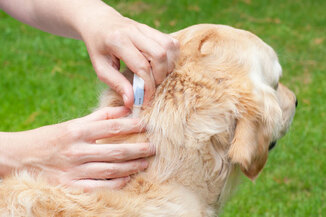
Heartworm feels like a summer disease but mosquitoes are prolific right through September and don't fully taper off until November. That means transmission of heartworm disease can continue to occur as late as November. Ticks and fleas are also still very active at this time of year.
Today is the day to give another dose of the heartworm, flea and tick preventative medication prescribed by your veterinarian. Remember with the transdermal (liquid applied to skin) medications that you need wait at least four hours before giving a bath or letting the animal go outside in the rain.
Today is the day to give another dose of the heartworm, flea and tick preventative medication prescribed by your veterinarian. Remember with the transdermal (liquid applied to skin) medications that you need wait at least four hours before giving a bath or letting the animal go outside in the rain.
It's that time again: Heartworm, tick and flea medication!
Mosquitoes are a vector for numerous blood borne diseases in many types of mammals. With climate change, average temperatures are rising, this means wetter summers in Southern Ontario and milder winters. Mosquito populations are expected to increase and disease transmission will rise with them. West Nile virus is an excellent example.
The Government of Canada Website has advice for controlling larval growth:
The Government of Canada Website has advice for controlling larval growth:
- keeping your gutters clean
- emptying tire swings of water
- to avoid the problem completely, replace the tire with another type of swing
- storing flower pots, watering cans, boats and wheelbarrows upside down
- replacing water in bird baths and outdoor pet dishes at least twice a week
- covering garbage, recycling or composting containers to prevent water from gathering
- drilling holes in the bottom of containers that must be left outdoors uncovered
- emptying your rain barrel if the water is over a week old, unless it's protected with a fine screen
Labour Day Long Weekend Closure
Just a quick reminder that the Animal Hospital is closed for the statutory holiday of Labour Day (September 2) and Dr. Gold is not in the office on Saturday August 31. Make sure to pick up food and medications and book an appointment for any medical concerns prior to the long weekend.
Should your pet need medical assistance during this time, please contact the Mississauga/Oakville Veterinary Emergency Hospital at 905-829-9444. They are located at 2285 Bristol Circle, which is at the intersection of Upper Middle Road and Winston Churchill Blvd North. They are open 24 hours.
Should your pet need medical assistance during this time, please contact the Mississauga/Oakville Veterinary Emergency Hospital at 905-829-9444. They are located at 2285 Bristol Circle, which is at the intersection of Upper Middle Road and Winston Churchill Blvd North. They are open 24 hours.
Our creative team at the Animal Hospital of River Oaks take pride in providing educational information as well as keeping our River Oaks's Families well informed in up-coming events happening at the hospital!
Archives
June 2020
March 2020
November 2019
October 2019
September 2019
August 2019
July 2019
June 2019
May 2019
April 2019
March 2019
February 2019
January 2019
December 2018
November 2018
October 2018
September 2018
August 2018
July 2018
June 2018
May 2018
April 2018
March 2018
February 2018
January 2018
December 2017
November 2017
October 2017
July 2017
May 2017
April 2017
March 2017
February 2017
January 2017
December 2016
November 2016
October 2016
Categories
https://api.pethealthnetworkpro.com/v1/practices/9b0cebb5-40b2-8d36-d4c2-60de940a795b/survey-responses
